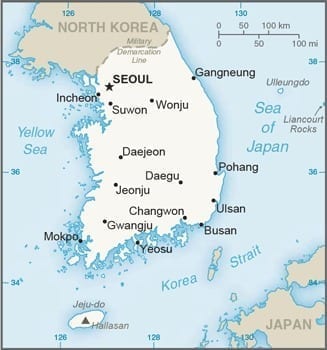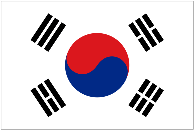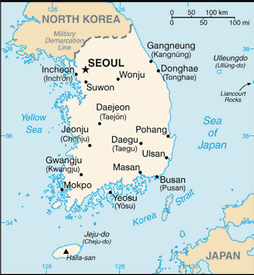Official Name: Republic of South Korea
National Symbols: Rose of Sharon, Tiger
Internet Domain: .ir
International Dialing Code: +82
| Location and Size | Economy | Business Climate |
| Government | Comparative Indicators | Business Protocol |
| Legal System | Credit and Collections | Other Sources of Info |
| Interesting Facts | Risk Assessment |
Location and Size
South Korea is located in Eastern Asia on the southern half of the Korean Peninsula bordering the Sea of Japan and the Yellow Sea. It has a total land area of 96,920 sq. km. making it slightly larger than the state of Indiana. The capital is Seoul, which is located in the Northwest of the country not far from the demilitarized zone between South and North Korea.
Government
South Korea is a republic made up of nine provinces and seven metropolitan cities. The country’s branches of Government are as follows:
- Executive: Chief of State: President MOON Jae-in (since 05/2017); Head of government: Prime Minister LEE Nak-yon (since June 2017); Cabinet: State Council appointed by the president on the prime minister’s recommendation
- Legislative: Unicameral National Assembly (299 seats; 245 elected in single-seat constituencies and 54 elected by proportional representation); members are elected for four year terms
- Judicial: Supreme Court (appointed by the president with the consent of the National Assembly); Constitutional Court (appointed by the president based on nominations by the National Assembly and Chief Justice
Legal System
South Korea has a mixed legal system combining European civil law, Anglo American Law and Chinese classical thought.
The country has not submitted an International Court of Justice (ICJ) jurisdiction declaration. (What does this mean?) It does accept International Criminal Court jurisdiction.
Interesting Facts About South Korea
- Most stores are open until at least 10:30 or 11:00 pm. Restaurants, bars, cafes and street food vendors stay open even later.
- Most homes are equipped with heated floors.
- The number “4” is considered to be extremely unlucky. Multi-story buildings do not include a 4th floor.
- Using red ink in writing a person’s name means that they are going to die or are already dead.
- The first cloned dog, named Snuppy, was “made” at Seoul National University.
- According to the OECD, South Korea has the world’s highest estimated national IQ. Areas where the populace excels include mathematics, science, problem solving and reading.
- South Korea is the largest shipbuilder in the world.
- The educational system is technologically advanced and South Korea is the first country to bring high-speed fiber-optic broadband internet access to all primary and secondary schools nationwide.
- South Korea is in the process of designing the first high speed rail system that will link Asia and Europe.
Economy
Over the past four decades, South Korea has demonstrated incredible growth and global integration to become a high-tech industrialized economy. The country’s dynamic economy has emerged from the ongoing global economic slowdown on a solid growth path.
In an effort to confirm its status as one of the world’s premier trading nations, the country has proactively entered into free trade pacts with several of the world’s leading economies. A vibrant private sector, bolstered by a well-educated labor force and a high capacity for innovation, has capitalized on the country’s openness to global commerce and an improving regulatory framework. The financial sector has also become progressively more open and competitive.
Leading Markets (2017): China 25.1%, US 12.2%, Vietnam 8.2%, Hong Kong 6.9%, Japan 4.7%
Leading Exports – Commodities: Semiconductors, wireless telecommunications equipment, motor vehicles, computers, steel, ships, petrochemicals
Leading Suppliers (2017): China 20.5%, Japan 11.5%, US 10.5%, Germany 4.2%, Saudi Arabia 4.1%
Leading Imports – Commodities: Machinery, electronics and electronic equipment, oil, steel, transport equipment, organic chemicals, plastics
Top Industries: Electronics, telecommunications, automobile production, chemicals, shipbuilding, steel
Top Agricultural Products: Rice, root crops, barley, vegetables, fruit; cattle, pigs, chickens, milk, eggs; fish
Comparative Economic Indicators ” 2018
| South Korea | China | Hong Kong | Japan | North Korea | Taiwan | |
| Population (millions) | 51.4 | 1,384.6 | 7.2 | 126.1 | 51.4 | 23.5 |
| Population growth rate (%) | 0.44 | 0.37 | 0.29 | -0.24 | 0.44 | 0.15 |
|
Age Structure (%)
(15 to 64 years old)
|
72.41 | 71.51 | 70.49 | 58.92 | 72.41 | 72.96 |
|
Age Structure (%)
(65+ years old)
|
14.55 | 11.27 | 17.14 | 29.38 | 14.55 | 14.36 |
| Literacy (%) | 97.9 | 95.1 | 99.0 | 99.9 | 98.0 (2008) |
988.5 (2014) |
| Unemployment rate (%) | 3.7 | 3.9 | 3.1 | 2.9 | 3.7 | 3.8 |
| Inflation (%) | 1.9 | 1.6 | 1.5 | 0.5 | 1.9 | 1.1 |
| Population below poverty line (%) |
14.4 |
3.3 | 19.9 |
16.1
|
14.4 |
1.5
|
| GDP** (USD billions) | 2,035.0 | 23,210.0 | 455.9 | 5,443.0 | 2,045.0 | 1,189.0 |
| GDP real growth rate (%) | 3.1 | 6.9 | 3.8 | 1.7 | 3.1 | 2.9 |
| GDP per capita** (USD) | 39,500 | 16,700 | 61,500 | 42,900 | 39,500 | 50,500 |
| Public debt (% of GDP) | 39.5 | 47.0 | 0.1 | 237.9 | 39.5 | 35.7 |
| Industrial production growth rate (%) | 4.6 | 6.1 | 1.7 | 1.4 | 4.6 | 3.9 |
| Exports (USD billions) | 577.4 | 2,216.0 | 537.8 | 688.9 | 577.4 | 349.8 |
| Imports (USD billions) | 457.5 | 1,740.0 | 561.8 | 644.7 | 457.5 | 269.0 |
| Reserves of foreign exchange and gold (USD billions) | 389.2 | 3,236.0 | 431.4 | 1,264.0 | 389.2 | 456.7 |
| Currency | Won KRW |
Yuan CNY |
Dollar HKD |
Yen JPY |
Won KPW |
Dollar NT$ |
| Exchange rates (per USD) 08/10/2019 | 1208.19 | 7.06 | 7.84 | 106.29 | 900.0 | 31.36 |
| Exchange rates (per EUR) 08/10/2019 | 1,339.34 | 7.83 | 8.69 | 117.97 | 1,007.26 | 34.76 |
| Rating in 2018 Corruption Perceptions Index*** | 5.7 | 3.9 | 7.6 | 7.3 | 1.4 | 6.3 |
| Rating in 2019 Index of Economic Freedom*** | 72.3 | 58.4 | 90.2 | 72.1 | 5.9 | 77.3 |
** PPP ” Purchasing Power Parity
*** 2018 Corruption Index: 10=Very Clean; 0=Highly Corrupt
**** 2019 Index of Economic Freedom: 100-80 = Free; 49.9-0 = Repressed
Economic Data from CIA World Factbook
2018 Corruption Perceptions Index, Transparency International
2019 Index of Economic Freedom, Heritage Foundation
Credit and Collections
South Korea’s Statutes of Limitations
- Open Account: 5 years
- Promissory Note: 5 years
- Written Contracts: 5 years
- Oral Agreements: 5 years
Dispute Resolution
Information primarily from the U.S. Department of State 2011 Investment Climate Statement ” Republic of Korea
Serious investment disputes involving foreigners are the exception rather than the rule in South Korea. A body of law exists for governing commercial activities and bankruptcies. These laws constitute the means to enforce property and contractual rights, with monetary judgments usually levied in the domestic currency. Foreign court judgments are not enforceable in Korea. Unfortunately, however, corruption continues to damage government integrity and undermine the foundations of economic freedom.
Commercial disputes can be adjudicated in a civil court. Foreign businesses, however, often feel that this is not a practical means to resolve disputes as the proceedings are conducted in Korean, often without adequate translation. Korean law prohibits foreign lawyers who have not passed the Korean Bar Examination from representing clients in Korean courts. Civil procedures common in the United States, such as pretrial discovery, do not exist in Korea. During litigation of a dispute, foreigners may be barred from leaving the country until a decision is reached. Legal proceedings are expensive and time-consuming and lawsuits are used only as a last resort, signaling the end of a business relationship.
Arbitration is probably the best route for handling trade disputes. In any contract, it’s a good idea to provide for arbitration by a neutral body such as the International Council for Commercial Arbitration (ICCA). When drafting the contract, it is important to seek local expert legal counsel.
South Korea is a member of the International Center for the Settlement of Investment Disputes (ICSID). It has also acceded to the United Nations Convention on the Recognition and Enforcement of Foreign Arbitral Awards (New York Convention) and is a member of the World Bank’s Multilateral Investment Guarantee Agency (MIGA). Keep in mind, however, that Korean courts may ultimately be called upon to enforce an arbitrated settlement.
Risk Assessment
Coface Country Rating: A2 — The political and economic situation is good. A basically stable and efficient business environment nonetheless leaves room for improvement.
Coface Business Climate Rating: A1 — see above. Corporate default probability is low on average.
Credendo Political Risk Rating: 1 — Lowest risk
Credendo Commercial Risk Rating: A — Lowest risk
Business Climate
South Korea has experienced decades of impressive economic growth since the early 1960s and has sophisticated electronics, telecommunications, automobile, and shipbuilding industries. Its long-term challenges include an aging population, inflexible labor market, and heavy reliance on exports – which comprise half of GDP.
Economic Freedom: South Korea’s economic freedom score of 72.3 makes its economy the 29th freest in the 2019 Index. The country is ranked 7th out of 43 in the Asia-Pacific Region. (2019 Index of Economic Freedom)
Market Access: The long anticipated Korea-U.S. Free Trade Agreement (KORUS-FTA) was implemented on March 15, 2012 becoming the United States’ largest Free Trade Agreement since NAFTA. The agreement has the potential to increase U.S. exports to Korea. In 2011, for the first time, total U.S.-Korea trade exceeded USD 100 billion.
Regulatory System: The Korean regulatory environment can pose challenges for both foreign and domestic firms. Laws and regulations are often framed in general terms and subject to differing interpretations by government officials. This creates frustrations for foreign investors that are looking for certainty in the Korean market.
Intellectual Property Rights: Protection of intellectual property rights needs to be improved, as piracy of copyrighted material is significant. The importance the government places on IPR protection has increased considerably. But while significant progress has been made, concerns remain about high levels of online piracy, software piracy, book piracy in universities, counterfeiting of consumer products. Also of concern are protection of undisclosed test and other data for pharmaceutical marketing approval and a lack of coordination between Korean health and IPR authorities to prevent the issuance of marketing approvals for patent infringing products.
Exchange Control: Exchange controls exist, but have been gradually liberalized.
Corruption: Corruption within the government and legal system remains a cause for concern.
Political Violence: Technically, the Democratic People’s Republic of Korea (also known as North Korea or the DPRK) and the Republic of Korea (ROK) are in a state of war. There is general peace and stability on the Korean peninsula because of an armistice agreement that has lasted for close to 60 years. From time to time incidents involving military and political provocations have increased tension between the countries.
For more detailed information on these topics, visit the 2019 Investment Climate Statement – South Korea, U.S. Department of State
Business Protocol in South Korea
- South Koreans prefer to do business with people with whom they have a personal connection. Therefore, it is crucial to be introduced by a third-party.
- South Koreans treat legal documents as memorandums of understanding and view contracts as loosely structured consensus statements that broadly define agreement and leave room for flexibility and adjustment as needed.
- Under no circumstances insult or criticize a Korean in front of others. Sensitive matters may often be raised indirectly through the intermediary that first made the introduction.
- Have all written materials available in both English and Korean.
- Business attire is conservative. Men should wear dark-colored, conservative business suits with white shirts. Women should dress conservatively and wear subdued colors. Men should avoid wearing jewelry other than a watch or a wedding ring.
- Business cards are exchanged after the initial introductions in a highly ritualized manner. The way you treat someone’s business card is indicative of the way you will treat the person. Using both hands, present your business card with the Korean side facing up so that it is readable by the recipient. Examine any business card you receive carefully. Put the business cards in a business card case or a portfolio. Never write on someone’s business card in their presence. Have one side of your business card translated into Korean.
More information on Business Protocol: Kwintessential — South Korea
Sources for further information on doing business in South Korea
American Chamber of Commerce in Korea
Doing Business in Korea; 2019 Country Commercial Guide for U.S. Companies
Embassy of the Republic of Korea in the USA – South Korean Ministry of Foreign Affairs Website
Embassy of the United States in Seoul, South Korea
**********
Subscribe to the Credit-to-Cash Advisor
Monthly e-Newsletter — It’s Free
This information is provided by ABC-Amega Inc. Providing international receivable management and debt collection services for exporters to more than 200 countries including South Korea. For further information, contact [email protected].
This report represents a compilation of information from a wide variety of reputable sources.
Comparative Economic Indicators: CIA World Factbook
Risk Assessment information: Coface Country Rating, Ducroire/Delcredere and Political Risk Insurance Center.
Exchange Rates: OANDA.com The Currency Site.


